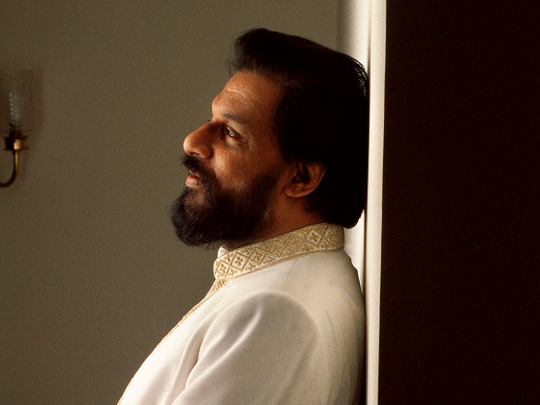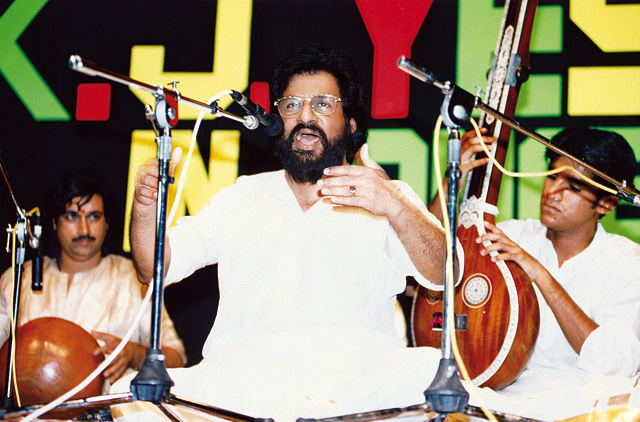
For a person who is highly respected and who wields enormous clout in the Indian music industry, K J Yesudas (the initials stand for Kattassery Joseph but he's known simply as Yesudas), is an unassuming man. Although he has more than 50 years of experience at the top, has sung over 50,000 songs in almost all the Indian languages as well as in Malay, Russian, Arabic, Latin and English, and he has a shelf full of awards and citations, he, unlike many of his ilk, does not throw a tantrum when our interview has to be cancelled at the last minute.
Grace personified when Friday meets him prior to Gandharva Gaanam, a show to be held today in Dubai, where he will be given an award for his contribution to the Indian music industry, he simply says, "I know there must be a reason you couldn't keep the appointment.''
Although he's 72, from Kerala, India, and has won the National Award for the Best Male Playback Singer seven times (more than any other Indian singer), and the State Award for the Best Playback Singer 43 times, he still commands a huge following, and has more young fans than his son, singer Vijay Yesudas, 33.
Proof of that are the hordes of adoring fans waiting to catch a glimpse of the singer outside the Dubai hotel where our interview is conducted. More than half of them are teenagers who had come to know that the star was staying there.
Yesudas has won numerous awards including an honorary award in 1999 by Unesco for Outstanding Achievements in Music and Peace at the "Music for Peace" event in Paris, a concert held to mark the dawn of the new millennium and whose attendees included artistes such as Lionel Richie, Ray Charles and Montserrat Caballé. A Padma Shri (one of the highest awards given to civilians in India) winner in 1975, he also received the Padma Bhushan in 2002 for his contributions towards the arts. The man for who music is a way of life waxes lyrical on his career, early life and dreams:
Work
My parents - Augustine Joseph and Elizabeth - discovered my talent for singing when I was a kid. I remember them telling me that I sang a classical piece after listening to it a couple of times when I was two-and-a-half years old.
My father was a very popular singer and stage actor during his time, in the 1950s. But he didn't take any formal lessons in music, which was probably why he insisted I study music so I could get a proper base and build a strong career in it. That said, it wasn't that he was imposing his dreams upon me; he recognised my talent and wanted to equip me to exploit it fully. We were four brothers, and I was the eldest. My younger brothers too have some singing talent, but aren't in the field of music.
So I really can't say if it was my talent that brought me success or my father's dedication to honing my voice. While I attribute my success to God I also believe I owe a lot to my father.
One important lesson I learnt from him was to never do anything you are not qualified to do. Though he was a very good singer, he never sang classical Carnatic (a system of music associated with the southern part of India) songs as he wasn't trained in it. That's a lesson I never forgot.
I started learning music at the age of five. During those years - the 40s - music was the only thing on my mind. I didn't learn music because I wanted to become famous or earn a lot of money. It was to follow my father's advice and learn as much as I could about music. All the material success and accolades are a result of pursuing that goal.
It was only in my late teens when my father's health started failing and we were in dire straits that I considered taking it up as a profession to help my family's financial condition. I began singing professionally, for films, at the age of 21.
I remember my father telling me, "You will get what you deserve; you don't have to go begging for anything." And that has been my experience too.
One piece of advice I often give young singers, including my son Vijay, is to not get sidetracked from their primary duty of learning music. This is the age of marketing and hard sell. Everybody wants instant results. But no amount of hard sell will prop you up if you don't hone your craft. Success is ephemeral; only talent lasts.
I learnt this lesson from one of my gurus, Palakkad Mani Iyer, one of the greatest Carnatic percussionists from southern India. After a concert, he would never wait to be paid. "Money should follow me, not vice versa," he used to say. And it did. It was not pride on his part. It was the value he accorded his art.
That's why it's so important to keep honing your art, no matter how successful or how experienced a singer you are.
Practising singing is quite like learning to be a marathon runner. It's not just about speed and power. It's about analysing each step, and deciding what and how much you have to put in where. It's in the details. You have to analyse the tune and tone, immerse yourself in it to come up with a performance of depth. That's the role of teachers. They guide us every step of the way.
My success, if you want to call it that, has been in not succumbing to temptations that would have taken me away from practising music in the proper manner. I practise music for four to five hours every day but there are moments when I feel like taking it easy and relaxing. During those moments, my passion for music and desire to keep improving force me to shrug off my lethargy. That's what keeps me going. It's not about earning money or fame, it's about respecting one's art.
That's why I don't give much credence to competition among singers. Your competition should be with yourself. Using that marathon analogy, you can't stop and pick up every runner who falls on the way to the finish line. They have to take care of themselves. Call it selfishness if you will, but I believe I have a job to do - which is to sing well.
Play
My life has been so inextricably tied to music and musicians - they are the ones who influenced me during my formative years as a singer. Though my father had died by the time I had made it big as a playback singer in films, I had a number of musicians like P Devarajan, V Dakshinamurthy, S Baburaj, among others who I looked up to and learned a lot from.
Though I am not very well-read, I looked for what was worth emulating from books. I adapted what I could to my life.
My teachers were a great inspiration. When I was studying music at the RLV Music Academy at Thripunithura, (southern Kerala), I was in a very tight financial situation. I couldn't even pay the fees. It was only Rs5 (less than 40 fils), but I couldn't afford to pay even that, let alone buy food. It was our Sanskrit teacher Padma, who helped me out those days. She's now bed-ridden. I consider her as my mother. She fed me as well as taught me and helped boost my confidence.
Then there was one Mr Rao who ran a small caféteria near our college. He knew my financial condition and would allow me to eat there, often for free. They were all indelible influences.
There were two teachers, Kumaraswamy and Kalyanasundaram, who influenced me greatly. I also remember a teacher named Harihara Subramania Iyer. He used to often deride me in class. But I don't hate him, because I feel he's the one who goaded me into becoming the singer I am today. He drove me to push myself, prove myself.
In fact, I don't hold any grudges with anyone. My father had a lot of friends when he was successful but they disappeared when he fell on bad times, then reappeared when I became a success. I didn't spurn them, but they taught me to take everything in life with a pinch of salt.
Marriage further strengthened my resolve to stick to my principles, because my wife Prabha is even more disciplined than I! For instance, if I want to relax with my family and plan to skip practice for a day, she will not have it and will persuade me to spend at least a few hours practising. We've been married 42 years now, and I would attribute my professional success in this period to her.
I have three sons - Vinod, Vijay and Vishal. I've been lucky in that it was my wife who looked into everything when they were growing up and allowed me to follow my career.
For me, relaxing is easy. I only have to turn to music, or even take up a book to read, and I just switch off from it all. Earlier I used to be crazy about playing tennis. I even used to put off recordings to play tennis. Lifestyle matters a great deal to a singer. If you are not disciplined in all aspects of your life, you will not make it. Health is of utmost importance. Only if you are healthy will you be able to resist the temptations life throws at you. I really enjoy eating sweets and ice creams, but I don't remember the last time I had one because they can affect my voice. I am fanatical about my diet, and it, perhaps, shows in my performances.
The importance of diet struck me when I was 65 and found that I had difficulty in pitching my voice high. I took that as a sign of ageing, and accepted it. But once on a tour in Canada I came across a book, Eat Right for Your Type by Dr Peter D'Adamo. It interested me as it talked about how food affects different body types. I began paying more attention to what I ate. The book says that my body type should not indulge in heavy exercises, that I should not eat wheat products. And when I followed the advice, it actually reflected in my singing. I started sounding younger and could hit the high notes again.
I feel when someone asks you to sing without preparation, you should not have to clear your throat even once. The words should just flow out of your mouth. And that will happen only if you are disciplined, in body, mind and spirit.
Dream
Personally I don't have many dreams except for the health and well-being of my family. I have already achieved much more than I dreamt of, and whatever I get is a bonus.
My dream now is to see people going beyond the boundaries of region and religion for the greater good of the country, and the world. Why are we so parochial and obsessed with ourselves, our family, our city? Why can't we think of the greater good of people at large?
I am a member of an informal group called Janapaksham (People's Side) which fights for people's rights in Kerala. We have many issues of public interest that we try to bring into focus. I hope we will be able to mobilise public support to help the disadvantaged.













